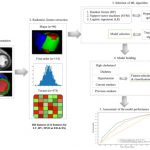
Ku Leuven Library. Photo credits: Wentao Jiang, CC BY-SA 4.0, via Wikimedia Commons
Project perspectives VI: interview with Pascal Borry
 Pascal Borry is Professor of Bioethics at the Centre for Biomedical Ethics and Law and Chair of the Department of Public Health and Primary Care at KU Leuven University. His main research activities are concentrated on the ethical, legal and social implications of innovative technologies. He published among other issues on topics such as direct to consumer genetic testing, public health genomics, biobanking, research on human tissue, genetic testing, pre-conceptional and prenatal screening, neonatal screening, and anti-doping. He is programme director of the Master of Bioethics and teaches medical ethics to medical students. He is a member of the Flemish Commission on neonatal screening (2012-now), a member of the Belgian Consultative Committee on Bioethics (2014-2018, 2019-2023) and an expert of the Belgian Superior Health Council (2014-2020). In euCanSHare, he is Co-leader of WP1, which addresses the ethical, legal and social aspects of data sharing.
Pascal Borry is Professor of Bioethics at the Centre for Biomedical Ethics and Law and Chair of the Department of Public Health and Primary Care at KU Leuven University. His main research activities are concentrated on the ethical, legal and social implications of innovative technologies. He published among other issues on topics such as direct to consumer genetic testing, public health genomics, biobanking, research on human tissue, genetic testing, pre-conceptional and prenatal screening, neonatal screening, and anti-doping. He is programme director of the Master of Bioethics and teaches medical ethics to medical students. He is a member of the Flemish Commission on neonatal screening (2012-now), a member of the Belgian Consultative Committee on Bioethics (2014-2018, 2019-2023) and an expert of the Belgian Superior Health Council (2014-2020). In euCanSHare, he is Co-leader of WP1, which addresses the ethical, legal and social aspects of data sharing.
1: How did you and your team get involved in euCanSHare? Which is your role in that project?Personally, I got involved in this project for two main reasons. The first one is because my background is focused on the societal challenges of new technologies. I have worked a lot in areas related to ethical and legal aspects of human genetics, from pre-conceptional or postnatal tests to the implementation of innovative technologies. More generally, my main activities are concentrated on responsible research and innovation, involving stakeholders in the process, and addressing ethical tensions. The second reason is that I’m actively involved in the Belgian Consultative Committee on Bioethics and I am also a member of the Research Ethics Committee at the University Hospitals Leuven. My team and I have been involved in several research questions such as exchange of available data for the sake of patient care, adequate processes for data sharing, societal concerns and risks (e.g., identifiability, abuse of certain information), researchers’ needs and concerns, different perspectives on data sharing from various stakeholders. In the framework of a collaborative research project, I worked with Mahsa Shabani, who is now a professor at the University of Gent, on controlled access models, their barriers and opportunities, their mechanisms, the role, and the governance of Data Access Committees. To sum up, me and my team got involved in this project due to our expertise, background, and prior research.
2: You are conducting an interview study with researchers regarding blockchain technology for data sharing. Could you please give us more details on this study? What we are doing in this project is methodologically in line with what we have been doing earlier. We have studied the views of the stakeholders in questions related to this project and specifically about incentives for data sharing and barriers to data sharing. Building a proper research infrastructure does not automatically lead to data sharing, an ecosystem must be developed to enable it. For this reason, we are looking into social interaction, policies, mechanisms, societal and individual willingness that play a significant role and have an impact on data sharing. One phase of the study is mapping. We conducted interviews with researchers from cohort studies and experts who build platforms. Through our questions, we tried to understand what factors affect data sharing.
3: Can you briefly describe the ethical, legal, and social implications of the euCanSHare platform?Through the interviews that I mentioned before we have actually identified a lot of implications. The factors that affect data sharing are sociocultural, ethical and legal. There are a lot of concerns about the bureaucratic load in data sharing. Systems which are based in trust should be developed and systems that allow data to be shared in a safe but also reciprocal way. Researchers should have the sense that they are equal partners. I share data, you also share data, we are in this together and this process is quite transparent for the shake of patient care ultimately. Those are some values that we need to aim for but of course it is not so easy when it comes to implementation. This needs to go beyond publications. Because if publications is the only way for someone to be evaluated on how he/she is performing, nobody is going to share data because then one has the impression that he/she looses control. The complexity of the existing and different legal frameworks in different countries can be also a barrier for data sharing but it can also be an alibi. It is easy to say that I am not legally allowed to share data and I am not going to do that. It also has to do with the interpretation of the frameworks. For example, GDPR can really be used as an instrument to share data. Some data officers see limits while others see opportunities to share data. The legal systems should support data sharing rather than limiting because with data sharing and data access we are not talking about language protection. This is often something that is being confused. Consent mechanism is one solution. Legitimate interest, public interest allows data sharing.
4: How euCanSHare contributes to citizens’ life?This project is actually opening a road for the future. The movement of open science develops and emphasizes core values on how we are doing research. This is really important for the future. With this project, we are trying to give emphasis on research integrity, transparency, interaction with society and promote reproducibility by giving access to data. We are trying to develop systems for rewards and incentives for data sharing. I think all the aforementioned changes are those that we can see in research and infrastructures like euCanSHare and that will allow open science and collaborative research to feasible in a global context. euCanSHare helps in that ambition.
5: Why cohort owners should share their data?The main reason is fundamentally an ethical one and has to do with building systems of reciprocity and mutual recognition. If we develop science in a reciprocal way then someday we will share our data and one other day someone else might need our data in turn. This kind of thinking about data sharing is crucial because it allows ultimately to develop systems and be transparent but also enables interaction and collaborations. Another reason is that by sharing data, we will manage to move faster in certain fields. This should be a motivation for the people in order to share data.
6: Which are the reasons that some data owners are not willing to share their data?The first factor has to do with credit and recognition. If you want to have people sharing data, you should offer them the mechanisms that will recognize who shared data. Limiting recognition to authorship creates quite a lot of limitations because the more data you bring together, you cannot continue to make papers with hundreds of authors, you come to the limit of those systems as well as the level of integrity, authorship guidelines. You need to pave the way for new rewarding mechanisms for those who share data. Those efforts should be recognized. If you don’t do this, you will have opposite result and people will not be willing to share data. So that is an important element. A second factor, which is also a concern of many people who generate data have, is that data will be misused due to misinterpretation or because they are not involved in the downstream process. This lack of involvement is being broad forward as an important element. You observe that a lot of people have this concern about their data. The third factor is the loss of control; the fact that it is really difficult for people to have the control of data, of what is happening. So you really need to think about how the Data Access Committee will evaluate that and through which mechanisms. In that sense, it may function wrongly. There is need to develop systems that are transparent in evaluating data access requests, that you can trust and ensure that there will be no conflict of interest or concerns on how it will be used. This can be linked with competitiveness when sharing data. Some people think that if they share any data they lose their competitive position. The fourth factor is the lack of resources. The process of developing sustainable systems of data sharing is really challenging because maybe you only get money to develop a cohort and then it is difficult to make this sustainable in the long term and to develop structures that allow people to ask for access. You need to make sure that you are able to monitor that, to organize that and you see that there is really the need to have sustainable mechanisms that are not in the level of research. Because if someone retires you don’t have a sustainable system. So you need institutions and funders to get involved and take some leadership in developing structures. Because if you leave it at a local level, it might not turn into a sustainable structure and this is something really important.
7: What are the main barriers to health data harmonisation?That is maybe a question that is less in my area in the sense that health data harmonization is not really my core business but if I am thinking about the societal elements, the legal barrier is an important element. We should invest and make sure that mechanisms are being developed and there might be technical elements. There are tools that are being developed and through which you can access data as a registered, trusted user. Removing potential legal barriers, making standardizations at the level of consent, having transparency in health data harmonization are some solutions in order to overcome the main barriers in the field. We also need to make sure that those people who are willing to share data will not face any unnecessary bureaucratic limits so they can maintain this willingness.
8: Which is the best part of your work in this project?One really nice element of our work in this project together with the European Society of Cardiology is that we are also having workshops discussing the agenda-setting for data sharing. It is something that we really enjoyed and probably we will need more of this kind of exercises because during those workshops a lot of people are being brought together, a lot of opinions are being heard in order to develop the agenda for the future, change points of views and orientations and identify of what we need to do in order to stimulate data sharing. The interviews that we are conducting are also a very interesting and nice part of our work.
9: What are the main challenges of the project?Interdisciplinarity is of course a challenge. We are many people with different backgrounds, we are all very busy with different things that we have to do each one in our sector and sometimes it is not easy to follow all the activities, all the meetings, etc. But I have to say that everybody is doing their best and try to contribute as much as they can. Cocreation is another difficult part when a lot of people are working together. It is really important for all the partners in every project to realize that and try to see how the interaction can be facilitated.
10: What else would you like to share with the reader?We have already two published manuscripts and there are also two others in press and one under the review process. Stay tuned because more things will come in the near future!

